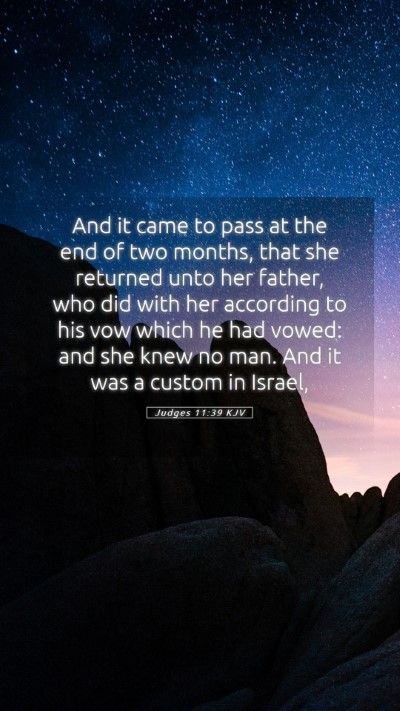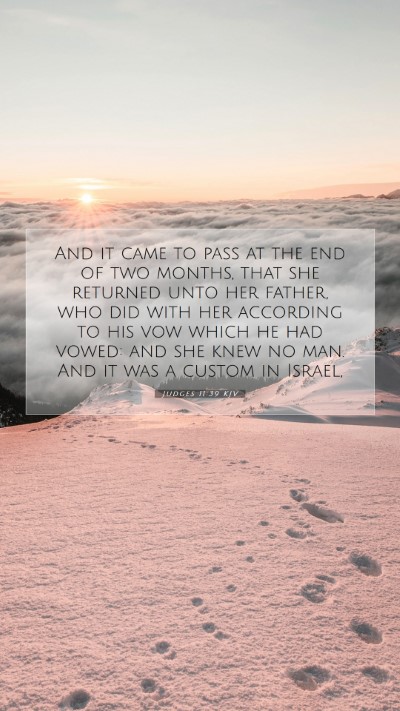Bible Verse Commentary on Judges 11:39
Introduction
Judges 11:39 presents a profound moment in the narrative of Jephthah, illustrating themes of vows, sacrifice, and the consequences of one's words. This verse reads: "And it came to pass, at the end of two months, that she returned unto her father, who did with her according to his vow which he had vowed: and she knew no man." The implications of this verse are significant, intertwining profound emotional and theological aspects of the biblical text.
Understanding the Passage
This verse marks the culmination of a tragic story where Jephthah, the judge of Israel, makes a rash vow to God. Let us delve into the meanings indicated by the public domain commentaries.
1. The Nature of Jephthah's Vow
- Matthew Henry: Henry interprets Jephthah's vow as a demonstration of a lack of understanding of the gravity of vows made before God. His determination to win in battle led him to make a promise that would ultimately result in great personal tragedy.
- Albert Barnes: Barnes emphasizes that Jephthah's vow was not only impulsive but also misplaced, as he should not have expected God to require such a sacrifice. This highlights a misunderstanding of God's desires and intentions in the relationship with His followers.
- Adam Clarke: Clarke notes that such vows were common in Israel but elucidates that blind commitment to fulfill them, despite their nature, can lead to catastrophic consequences.
2. The Role of Jephthah’s Daughter
The focus on Jephthah's daughter provides critical insights into the personal cost of his vow.
- Matthew Henry: He highlights the importance of the daughter's character, showcasing her submission and understanding. Instead of protesting, she acknowledges her father's vow, which speaks to her integrity and honor.
- Albert Barnes: Barnes underscores the tragic heroism of the daughter, who accepts her fate with dignity, representing a profound loyalty to family and faith even in the face of impending death.
- Adam Clarke: Clarke discusses the depth of the sorrow felt and the cultural implications of such sacrifices, noting that the emotional conflict is palpable in this narrative.
3. The Theological Implications
Judges 11:39 raises significant theological questions regarding vows, sacrifice, and divine requirements.
- Matthew Henry: He interprets this as a cautionary tale about the weight of our words and the promises we make, especially in contexts of desperation. The narrative evokes reflections on how our actions can resonate through generations.
- Albert Barnes: Barnes reflects on the covenant relationship between God and Israel, noting that true worship and sacrifice should align with God’s desires rather than personal ambition or recklessness.
- Adam Clarke: Clarke's analysis points to the distinction between the true spirit of devotion and the letter of the law, arguing that God desires mercy and obedience over ritualistic sacrifices.
Cross References
- Genesis 22:1-2: The story of Abraham’s willingness to sacrifice Isaac parallels the themes of sacrifice and obedience.
- Leviticus 27:29: This verse discusses the valuation of vows made in the context of the Israelite sacrificial system.
- Matthew 5:33-37: Jesus' teaching on taking oaths urges a deeper consideration of integrity and our spoken commitments.
Application and Reflection
The resonating questions left by Judges 11:39 compel us to consider the following:
- How important is our discernment before making commitments to God?
- In what ways can we ensure that our promises align with God’s will?
- What do we learn from the daughter’s response about grace and acceptance in difficult situations?
Conclusion
Judges 11:39 serves as a powerful reminder of the complexities of our words and the promises we make. This examination through the lens of rich biblical commentary reveals deeper insights into how we approach vows and the weight they carry in our spiritual journey.
The verse encourages reflection on the importance of understanding Scripture, the significance of our commitments, and applying biblical lessons to our daily lives.


